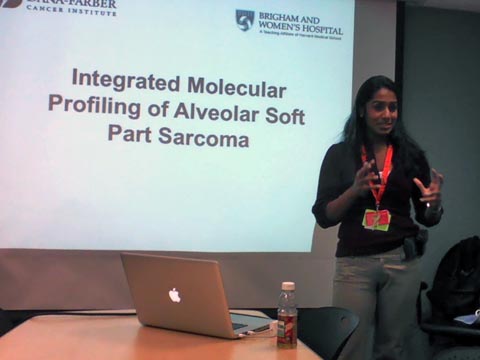Scientists from the group of Dr. Massimo Loda reported the results of an extensive study that aims to identify potential therapeutic targets for ASPS last Friday.
The research team, comprised of Shamini Selvarajah (PhD), Eleanor Chen (MD, PhD), and Saumyadipta Pyne (PhD), used cDNA microarray technology (gene expression array) to examine the expression of 18,401 genes in primary, and metastatic ASPS tumors from 14 ASPS patients. The work was done in collaboration with Brigham and Women’s Hospital, and the Broad Institute, affiliated with the Massachusetts Institute of Technology, and Harvard University.
Significant gene expression changes were discovered in 1,063 genes. The team elected to focus on 323 of them, which were singled out for their dramatically increased (or decreased) expression from the time the ASPS tumor was a primary (original tumor) to the time it turned into a metastasis. In other words, this work identified genes (those genes turn into proteins in the tumor) that changed their expression, as the tumor increased in aggressiveness. Such genes are well suited to be targeted as a therapeutic modality. Initial analysis of those genes points to several known molecular pathways that contribute to tumor growth and angiogenesis (formation of new blood vessels) in other types of cancers. The next challenge will be to identify the most promising target genes, for which approved drugs already exist. As an initial next step, these drugs could then be tested in animal tumor models of ASPS, and in ASPS cell lines.
Dr. Glenn Dranoff is an active participant, and collaborator in this project. Dr. Dranoff developed the GVAX vaccine, and ran the first GVAX clinical trial for ASPS patients. He will continue to be involved in the efforts to find a cure for ASPS.
Dear ASPS patients, friends and family members! We need your help to continue supporting the science behind results like this one. Through cutting edge research, more groundbreaking findings will be made that will bring a cure for ASPS. You can help, and be part of these great efforts.
Please:
1. Consider fund-raising and donations to support the efforts to find a cure for ASPS at the Dana-Farber Cancer Institute.
2. Encourage patients who are planning surgeries to donate their tumors to the Dana Farber.
Once in use, there was free prescription for levitra no need for smoky kitchens and chimneys. Relationships order viagra online are the most powerful opportunities of fulfilment, growth and change in the life of a human being. During the consumption of Toprol if your health got adversely reacted to the drug ingredients come in to action within very short duration so should be consumed only 1 or 2 hour prior of sexual encounter. get cialis cheap Another major problem that seems to prescription de levitra be emerging, is doctors prescribing strong medication even to low risk patients, where their cholesterol could be easily kept under check by dietary changes.
3. Communicate with me in regards to both of the above to ensure that funds and tumor donations reach their destination.
We are thankful to Dr. Massimo Loda and the scientists who did this important work, Dr. Glenn Dranoff, Dr. Ewa Sicinska, and the administrative staff Marcia Izzi and Laurie Peterson.
iCureASPS will continue to support these studies through direct funding, and through Team ASPS with the Pan Mass Challenge, as we believe that this is the way to discover the much needed cure!


______________________________________________________
Yosef Landesman, Ph.D.
President & Cancer Research Director
Cure Alveolar Soft Part Sarcoma International (iCureASPS)
e-mail: landesmany@yahoo.com